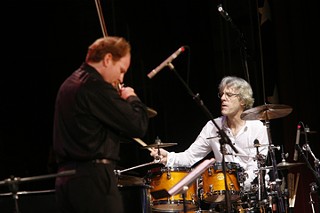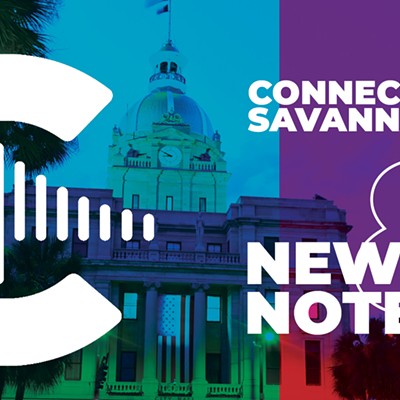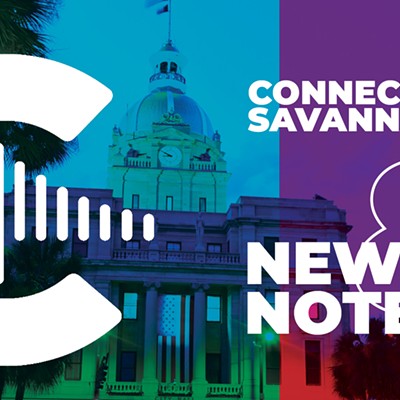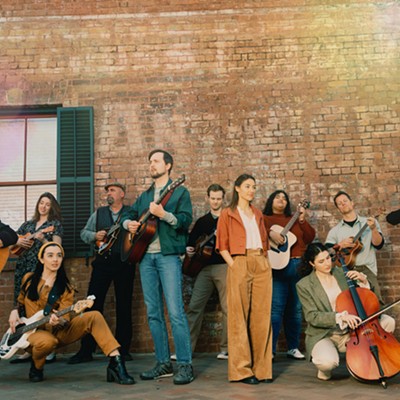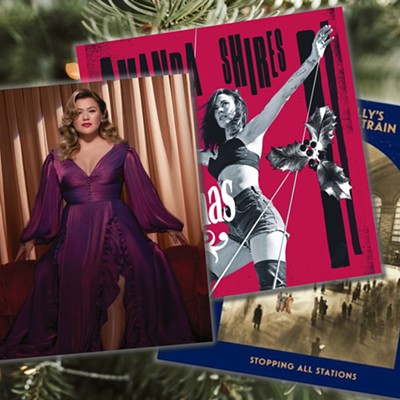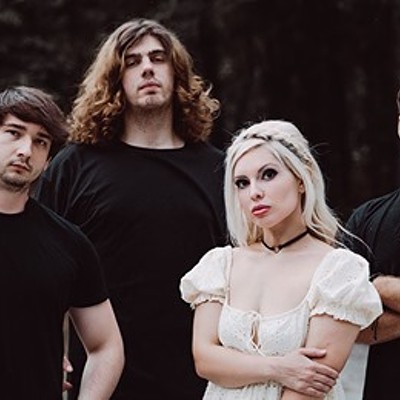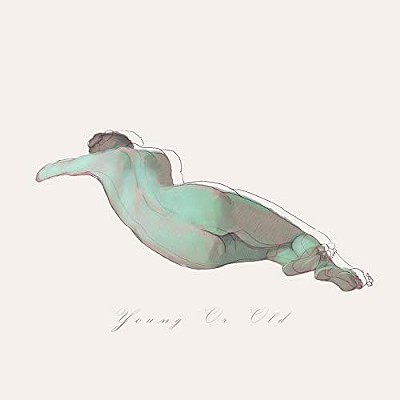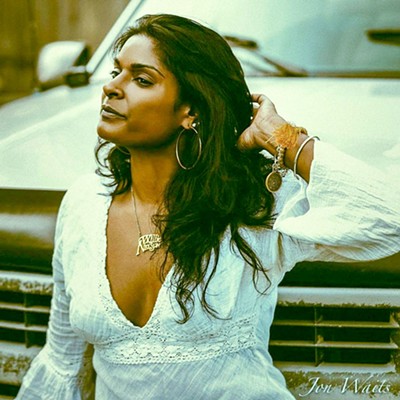The 1,000+ seat room was packed to the gills with an unusually wide range of listeners, from older, genteel Savannah Music Fest patrons to pre-teen kids. It was apparent even before the first notes were struck that a sizable portion of the crowd had virtually no idea what sort of music would be performed that evening, but most everyone seemed eager to let the unusual event wash over them.
Copeland's tenure in the recently reunited reggae-rock-jazz-pop superstar trio The Police was covered in great detail, as the final third of the show featured a rare public big-screen showing of his recent DIY documentary on that band's earliest brushes with international fame and fortune Everyone Stares: The Police Inside Out.
That intensely personal 80-minute feature was compiled from boxes of previously unseen Super-8 footage shot by Copeland, his bandmates and their road crew on several of the group's early tours. This footage, which had been gathering dust for years, was cleaned up and digitally edited on Copeland's Macintosh, then set to a beguiling soundtrack of remixed and re-contextualized versions of old Police recordings he made himself from the original multi-track tapes, and topped off with an understandably ego-centric narration by Copeland himself.
The film is intriguing, especially if you are a diehard Police fan, as it offers a viewpoint that has rarely (if ever) been used in most music documentaries. In this film, the audience is as much a part of the movie as the artists themselves. That's because the artists are - by and large - the ones doing the shooting.
We're suddenly witness to the madness they see screaming back at them, rather than the other way around.
It's a tantalizing glimpse at a much simpler time in terms of both rock and roll and pre-internet mega-celebrity. However, Copeland's narration, while informative and at times humorous, too often comes across as self-important. Anyone who has seen Copeland interviewed over the years (or read accounts of his behavior from others in the biz) knows that he has a solid rep for being quite impressed with himself. That's understandable to a certain extent, because he is acknowledged far and wide as a phenomenally talented and trend-setting percussionist, as well as a gifted and idiosyncratic orchestral composer.
It's just that to some, his loopy demeanor (which was in full bloom during the second portion of this one-time-only event, a lengthy Q & A with the audience, nominally moderated by Copeland's good friend and the SMF's Associate Artistic Director, world-famed violinist Daniel Hope) can get a little tiresome after a while.
His non-stop, slightly manic, "Aw shucks, I'm GREAT and so is just about everything I touch, but it's cool that I'm self-absorbed because I also make sure to effusively compliment my collaborators" bit at times makes you want to just take him somewhere quiet, dim the lights, give him a cup of Sleepytime tea and close the door.
Whereas the theater was probably only half full by the time the film unspooled (understandable, as it was a long evening, and many folks may have already seen Everyone Stares, which has been out on DVD for some time now), the vast majority of folks stuck around after the live performance section of the night to hear Copeland answer questions from the crowd.
In an interview with me a few days before the show, Copeland admitted that he assumed most folks would want to ask him about the Police's reunion tour that is entering its final leg, but that he was willing to address any topics. "My life is an open book," he said.
It's too bad that a handful of people in the crowd insisted on wearing out the same three pages over and over again.
Turns out that the first few rows directly in front of the stage were filled with a large contingent of uber-fans (most of which were wearing matching green shirts as an in-joke sign of solidarity with Copeland), many of whom had traveled hundreds if not thousands of miles to make the gig. Copeland explained at one point that these people represented the core group of his loyal followers, who had helped jump-start his personal website in its infancy, and he admitted he might wind up doting on them about as a result.
Many of the folks in this group have been e-mailing each other (and Copeland) for years now, but have rarely if ever met in person. He knows most of them solely by their screen names. At least one in the group boasted of having seen one-fifth of all the shows on this entire Police tour (over 20 shows), so to say they were giddy to be sitting less than 30 feet from their idol is an understatement.
Now, don't get me wrong. I think it's actually fantastic that these folks (seemingly) received some sort of priority seating, and that they had come prepared to make the most of their face-to-face contact with their musical hero. However, Copeland understandably felt obliged to cater to this group. And cater he did.
It goes without saying that every one of these folks had numerous questions they wished to ask, and their proximity to him, coupled with his willingness to defer to them in thanks for the copious amount of goodwill they have thrown his way for ages, meant that by and large, he got sucked into speaking mostly to, about and for this batch of fans, at the unfortunate exclusion of the majority of the rest of the crowd.
Some of the uber-fan questions were of interest to the casual listener, but many of them were myopic, insular, or overly technical in regards to the subtle intricacies of his drumming style or the specific electronic equipment he uses onstage with The Police .
I knew ahead of time that Copeland was actually planning on leaving during the film screening to head back to L.A., but it would have made a lot more sense (and been a lot more kind to both these longtime fans and the rest of the assembled crowd) for him to have made the time to give them even 15 minutes of private backstage access to hang, fawn and ask him whatever they wanted.
This would have freed up plenty of time for a true Q & A with the average audience members, many of whom seemed to feel marginalized by the folks up front. I can't help but think that unfortunate dynamic had a great deal to do with the mass exodus which took place as the movie began.
Then again, this entire middle portion of the event had a very relaxed, off-the-cuff feel to it that was endearing in many respects for its lack of formal structure.
By far, the most interesting and entertaining part of the night was the beginning of the show, during which Copeland premiered some brand new work which had been commissioned by the SMF at the request of Daniel Hope, an amazing violin and viola player who accompanied Copeland and pianist Sebastian Knauer on one dazzling piece for drums, piano and violin. There was also a 15+ member one-night-only mini-orchestra on hand (made up of both standout local players such as violinist Ricardo Ochoa and pianist Eric Jones, as well as special guests from across the country).
In addition to the new work (written in honor of one of Copeland's daughters), Copeland and the full group also performed several selections from his most recent album Orchestralli - a critically acclaimed instrumental album which bears little resemblance to his work with The Police, as well as music from earlier in his solo career (including at least one track from his well-known score to the the Francis Ford Coppola film Rumble Fish).
You could practically hear people scratching their heads as this massive ensemble tore through the complex, quick-tempoed, highly percussive and rhythmically challenging compositions for strings, keyboards, bass and drums. This was not what many of them had perhaps expected, and Copeland acknowledged as much later in the Q & A, thanking them for coming and for politely (and in most cases, enthusiastically) listening to this much less commercial and more heady part of his ouevre.
The live portion of the show was impressive, but at times difficult to fully appreciate because of the inherent difficulties in properly mixing and amplifying relatively quiet acoustic instruments, while a powerhouse drummer (who's known for being loud and over-the-top) bashes away on a massive set of drums and cymbals just a few feet away from them.
The thin and lanky 50-ish composer was situated on the far right of the stage, with his drums positioned in profile to the audience, so they could clearly see what he was doing, and he could easily watch the rest of the musicians.
Copeland (who's in fantastic shape for his age, no doubt owing to a healthy California lifestyle and athletic preparation for the massive world tour he's currently on with the band which made him famous) worked up a feverish sweat only a few minutes into the show from pounding away at his trap kit with the idiosyncratic form of precise abandon he's known for. Often, it seemed that his own drumming was actually the part of the compositions which meshed the least with everyone else on stage, but then again, as he readily acknowledges, he was the draw.
Many of these works, which contained elements of rock, jazz, reggae, classical and even chamber music might best be described in a broad sense as sounding not at all unlike a great deal of the late Frank Zappa's more ambitiously orchestrated pieces, albeit without the advent of any guitar (save an electric bass) or synthesizer.
Copeland broke sticks several times during the night and, as he's wont to play the fool, while fishing for a replacement, made an exaggerated point of dramatically throwing several perfectly good drumsticks up and over his head while grinning broadly.
In the end, despite the awkwardness which slightly dampened the Q & A, Stewart Copeland came across as a supremely talented, slightly cocky workaholic who has a strong desire to be accepted on his own merits as an artist - as opposed to a sideman in a ridiculously famous pop group.
It was interesting to watch how many times he told the crowd in a heartfelt manner that as far as he was concerned, he'd much rather take the 1,100 people in that room cheering for his esoteric, orchestral works than 75,000 screaming fans at a Police reunion gig.
Were it not for the legitimate sense of pride and happiness that practically beamed off his face, it would be easy to write off such exclamations as cheap and easy applause lines. Yet, it's transparently obvious that Copeland's heart lies with his solo works.
That was never more evident than when he gave a long, rambling, circuitous answer to a relatively innocuous question regarding the soon-to-be-completed victory lap with his fellow rock stars.
Over the course of what seemed like forever, Copeland explained, emphasized and then re-emphasized that while he and his band-mates were enjoying their romp through old tunes (and enjoying making a fortune), they had long ago lost most if not all of the personal connection to the hits they were expected to play night after night. According to Copeland, The Police's back catalog doesn't feel relevant to his life anymore, nor does it particularly to Sting or Andy Summers.
However, the band members recognize that over time and through repeated airplay, the records they made have been so indelibly stamped on the conscious and subconscious minds of people all over the world (many of whom were not even born when those albums were first released), that those tunes have become almost spiritual mantras to many of their fans.
"These songs don't belong to us anymore," he said several times, as if he was simultaneously in awe of this perceived fact and more than a bit sad that something he helped to create could - even though becoming so popular - essentially be taken away from his control. "They belong to all of you."
"I'm not sure if some Police fans will even understand what I'm getting at," he continued. "And they may be upset to hear me say this - but for us, playing these songs is not exciting in the way that it once was. Now, it's become more like a ceremony."
"People come to gather and hear these songs that they've known all their lives, and which they've grown up to and which mean more to them than we could have ever imagined. And we show up and play them for them because only we can."
Implicit in what Copeland described (and his take on how each of the band members' interests have changed and grown apart over time) was the definite sense that The Police would never, ever be a functioning creative entity again, nor perhaps should they be. When this tour is over, they'll each return to their own lives - much, much, much wealthier and - perhaps - slightly better friends.
Or at least friends with closure.
And then he'll continue on in his creative journeys, crafting evocative film and TV scores, and writing operas, chamber music pieces and ballets that a tiny, tiny fraction of Police fans will ever hear about, let alone actually hear.

